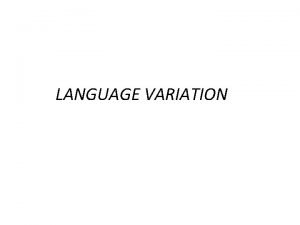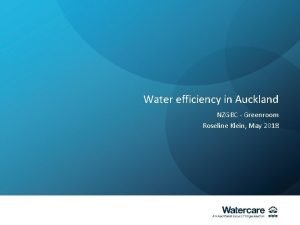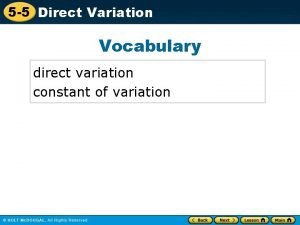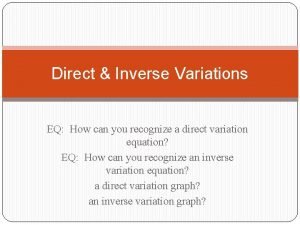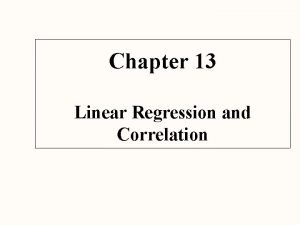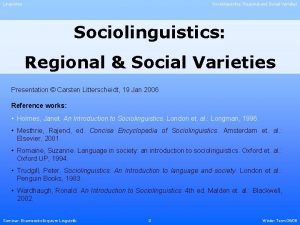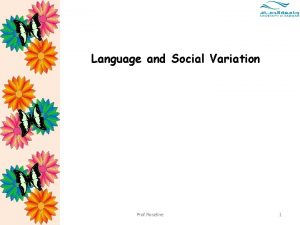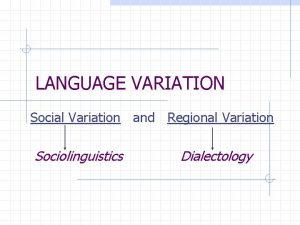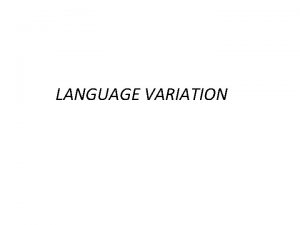LANGUAGE AND REGIONAL VARIATION Prof Roseline 1 Social






- Slides: 6

LANGUAGE AND REGIONAL VARIATION Prof. Roseline 1

Social dialect: a variety of a language with features that differ according to the social status (e. g. middle class or working class) of the speaker The two main groups are generally identified as “middle class, ” those who have more years of education and perform non-manual work, and “working class, ” those who have fewer years of education and perform manual work of some kind. “Working-class speech, ” - a social dialect. The terms “upper” and “lower” are used to further subdivide the groups, mainly on an economic basis, making “upper-middle-class speech” another type of social dialect or sociolect. - a variety of a language that is strongly associated with one social group (e. g. working-class speech) Characteristic of a social dialect, the social variable and the pronunciation or word the linguistic variable. A “prestige” form as a way of explaining the direction in which certain individuals change their speech overt prestige: the status of a speech style or feature as having positive value, but which is “hidden” or not valued similarly among the larger community, in contrast to overt prestige Prof. Roseline 2

Speech Accommodation Variation in speech style, we can see that it is not only a function of speakers’ social class and attention to speech, but it is also influenced by their perception of their listeners. Modifying speech style toward (convergence) or away from (divergence) the perceived style of the person being talked to This type of variation is sometimes described in terms of “audience design, ” but is more generally known as speech accommodation, defined as our ability to modify our speech style toward or away from the perceived style of the person(s) we’re talking to. We can adopt a speech style that attempts to reduce social distance, described as convergence, and use forms that are similar to those used by the person we’re talking to. Adopting a speech style that attempts to reduce social distance by using forms that are similar to those used by the person being talked to, as a type of speech accommodation, in contrast to divergence when a speech style is used to emphasize social distance between speakers, the process is called divergence. We can make our speech style diverge from another’s by using forms that are distinctly different. Adopting a speech style that emphasizes social distance by using forms that are different from those used by the person being talked to, as a form of speech accommodation, in contrast to convergence Prof. Roseline 3

REGISTER & JARGON Another influence on speech style that is tied to social identity derives from register. A register is a conventional way of using language that is appropriate in a specific context, which may be identified as situational (e. g. in church), occupational (e. g. among lawyers) or topical (e. g. talking about language). One of the defining features of a register is the use of jargon, which is special technical vocabulary (e. g. plaintiff, suffix) associated with a specific area of work or interest. In social terms, jargon helps to create and maintain connections among those who see themselves as “insiders” in some way and to exclude “outsiders. ” This exclusive effect of specialized jargon, as in the medical register (e. g. Zanoxyn is a nonsteroidal anti-inflammatory drug for arthritis, bursitis and tendonitis), often leads to complaints about what may seem like “jargonitis. ” Slang Jargon is specialized vocabulary used by those inside established social groups, often defined by professional status (e. g. legal jargon), slang is more typically used among those who are outside established higher-status groups. Slang, or “colloquial speech, ” describes words or phrases that are used instead of more everyday terms among younger speakers and other groups with special interests. Prof. Roseline 4

African American English Social variation based mainly on examples from British English and what we might call “European” American English. Labeling one general social variety according to the historical origins of the speakers allows us to put it in contrast with another major variety called African American English (AAE). Also known as Black English or Ebonics, AAE is a variety used by many (not all) African Americans in many different regions of the USA. It has a number of characteristic features that, taken together, form a distinct set of social markers Vernacular language The form of AAE that has been most studied is usually described as African American Vernacular English (AAVE). The term “vernacular” has been used since the Middle Ages, first to describe local European languages (low prestige) in contrast to Latin (high prestige), then to characterize any nonstandard spoken version of a language used by lower status groups. As the vernacular language of African Americans, AAVE shares a number of features with other nonstandard varieties, such as “Chicano English, ” spoken in some Hispanic American communities. Varieties of what has been called “Asian American English” are also characterized by some of the pronunciation features described in studies of this vernacular. Prof. Roseline 5

THANK YOU Prof. Roseline 6
